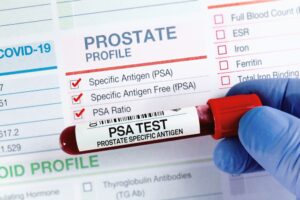Benign Prostatic Hyperplasia, or BPH, is a scary sounding name. It affects 25 percent of men by age 55 and half of the male population by age 75. It has easily recognizable symptoms, and is non-cancerous, but some of the test results can look like cancer. Let’s start at the beginning: how is BPH diagnosed?
Symptoms of BPH
BPH causes the prostate gland to increase in size. When this happens slowly over time, it interferes with the flow of urine through the urethra.
Typical symptoms include the following:
- Difficulty starting despite pushing or straining
- A weak stream of urine
- Interruptions while urinating
- Dribble at the end
- Frequent awakening at night to urinate
Men who begin to have these side effects should contact Dr. E. Brooke Spencer in order to get a diagnosis and treatment.
How Is BPH Diagnosed?
After reviewing your health history and completing an examination, you may receive the following tests:
Blood Test
This will identify anything else, such as kidney problems.
Urine Testing
This will look for any infections or other conditions that can cause similar symptoms.
Digital Rectal Exam
This involves the physician inserting a finger into the rectum to check for signs of an enlarged prostate gland.
Cystoscopy
A thin and flexible tube is inserted into the penis and through the urethra so Dr. Spencer can look at the bladder and urinary tract for any changes or blockages. Patients are given local anesthesia to eliminate any discomfort
PSA Blood Test
PSA stands for prostate-specific antigen blood test. This protein level increases when you have an enlarged prostate. Elevated PSA levels can be due to many other things including prostate cancer.
Urinary Flow Test
You urinate into a device that can measure the strength and amount of the urine flow. Over time, Dr. Spencer can tell if your condition is getting worse or better.
Post-Void Residual Test
This will determine how much urine is left in the bladder.
Schedule a Consultation for BPH Diagnosis in Denver, CO
At Denver BPH, Dr. E Brooke Spencer can diagnose conditions involving an enlarged prostate at our BPH treatment center in Denver, CO. If you are experiencing symptoms of BPH or have questions, please call (303) 805-7477 or request an appointment online.

